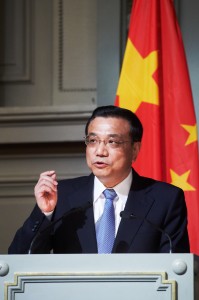
“China’s economic growth is unsteady, unbalanced, uncoordinated, and unsustainable,” admitted then-Premier Wen Jiabao at the annual meeting of China’s legislature in March 2007. The issue facing the Chinese Politburo in 2007, and still today, is not igniting economic growth, but rather reining in such exorbitant development. Contrary to Wen Jiabao’s concerns over the fragile state of the Chinese economy, China escaped relatively unscathed as the financial crisis of 2008 sent tidal waves crashing through major world markets. Not only did federal action save the country from catastrophe, it also helped the Chinese economy retain positive growth. Newly installed Premier Li Keqiang described China’s savvy response to the downturn as “innovative policies and measures with a holistic approach to pursue steady growth, conduct structural readjustment and promote reform, which served to ensure a smooth economic performance.” The policies enacted in response to the impending economic collapse in 2008 laid the foundation for extensive and comprehensive market reforms today. The new Chinese leadership, which formally took office in March 2013, made it a main prerogative to corral torrid economic growth to ensure a more sustainable future. Political reform, altering market structures and addressing domestic social issues such as environmental degradation and class disparity are quite ambitious tasks, but will ultimately prove necessary to avoid economic and social collapse.
The new group of decision makers within the Chinese government is committed to addressing the unsustainable nature of Chinese economic growth. Premier Li Keqiang outlined the new administration’s policies in a September 8 op-ed in the British newspaper Financial Times and spoke about the topic a few days later at the Summer Davos Forum in Dalian, China. First, he reiterated the Party’s commitment to political reform. The federal government announced on September 25 that it would relinquish administrative power over certain procedures, including approval of investment projects and licensing of corporate activity. When the transfer of these responsibilities to local authorities materializes, the number of administrative duties reallocated by the central government since March 2013 will total 221. Delegating power to lower levels of government will, in theory, streamline access to Chinese markets and increase overall government efficiency. In addition to transferring jurisdiction over these procedures, the Politburo eased restrictions on certain economic activities; banks are now allowed to determine their own lending rates, authorities are restricted in setting approval requirements in sectors where the market can effectively regulate itself and taxes on small businesses have been drastically reduced if not eliminated altogether. Generally speaking, the goals of political reform, or “institutional innovation” as Li Keqiang has termed it, within the CCP are to eliminate corruption and increase effectiveness through the consolidation of jurisdiction.
The most ambitious of the CCP’s new policies, however, is a complete overhaul of its economic strategy. This structural rebalancing will attempt to transform the Chinese economy from predominantly export-driven light industry to increasingly service-based. As of now, the service sector in China only contributes to 43% of the total economy, while the value is closer to 75% in the most advanced developed countries. The emphasis on expanding the service sector is warranted because service jobs require 35% more jobs per unit of output while consuming fewer resources and less energy. Straying from the proven strategy of unrestrained investment, relentless construction and outrageous amounts of manufacturing initially solicits a knee-jerk reaction from conservative members of the CCP. For over three decades, this strategy has brought China into the modern age, providing peasants and elites alike with basic needs such as clean, running water and luxury items; flat screen televisions and cellular phones are now commonplace in a majority of households. China was a largely impoverished, agrarian society during the 1950s and ‘60s. Now it is a beacon of hope for developing nations around the world. The pace of development has been incredible, miraculous even, but an economic strategy predicated on cheap labor, a disregard for environmental health and social rights and massive amounts of exports has its limits. To catapult their people to the next level of wealth, the CCP will chart a new course of economic strategy, embracing a bolstered service sector.
Luckily, the main driver of a larger service sector is increased domestic demand. China’s greatest resource is its enormous populace, which currently stands at 1.3 billion people. Rather than relying on foreign demand, the CCP is looking inward to utilize a resource that has hardly been tapped. The influx of rural citizens to urban areas can facilitate access to service markets, but this movement comes at a great cost. The CCP realizes that urbanization cannot be relied upon, but rather rural areas must be further developed. Railway projects are already underway in central and western provinces and government services such as healthcare, education and retirement programs have been dramatically increased throughout the generally poorer rural communities. The “Look West” policy, which has increased investments in the western provinces, has proved marginally successful thus far due to resistance from minority groups such as the Uighurs, but it has immense potential. Integrating formerly underdeveloped domestic markets will most certainly increase internal demand.
In addition to tackling domestic political reforms, the CCP’s attempts to ensure healthy economic growth and stability are manifesting themselves internationally. The new leadership has a renewed effort to open up China to the world. Such efforts include recently signed free trade agreements with Switzerland and Iceland and multilateral partnerships like the Chiang Mai Initiative or the expansion of the ASEAN-China Free Trade Area. Premier Li expressed the CCP’s position regarding participation in international activities, “Developing countries should have greater representation and bigger voices in international affairs so as to minimize the adverse impact of the change of macro economic policies by some countries on the entire world economy.” By integrating itself into international consortiums, China is bolstering its stake in the world system, giving it more control over markets at home and abroad. Premier Li stressed the fact that China is still a developing country, though, and, as such, is only responsible for accepting limited international responsibilities. This logic has been utilized by China to avoid committing to certain environmental responsibilities. An encouraging sign from Premier Li’s op-ed and subsequent speech, however, is that addressing environmental issues is being treated as a necessity for promoting sustainable growth. The language used by the Chinese government seems to imply that they understand the importance of protecting natural resources. The official party line has shifted its strategy to growth predicated on resource conservation and environmental protection, which gives way to higher quality and efficiency. Perhaps China’s newfound domestic commitment to environmental protection and other previously neglected issues will affect their policies abroad as well, leading them to assume a greater role in the world effort.
In 1978, Deng Xiaoping championed sweeping economic reforms coined “Reform and Opening Up.” During the next thirty years China experienced unprecedented and miraculous growth and development. Millions were lifted out of poverty, central government control was liberalized and the historically powerful Asian hegemon, the Middle Kingdom, has regained the respect it deserves as a great nation of the world. Today, the new leadership of the communist party has committed itself to following Deng’s lead. Through political and economic reform initiatives, policies encouraging foreign direct investment and a newfound resolve to address social and environmental problems, China is positioning itself to continue on the path to prosperity. As the Chinese would say, “死马当活马医”, or “do the impossible, for it may truly be possible.” After the destruction and mayhem of the Great Leap Forward and Cultural Revolution, the resolve and ingenuity of the Chinese people have proved that indeed, anything is possible.
